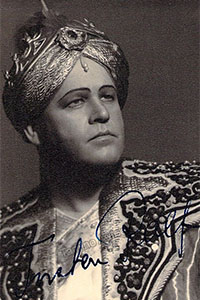The History of The Tenor Narrated
The History of Torsten Ralf

Born: January 2, 1901
Died: April 27, 1954
Swedish Tenor.
Narrative 1
The Swedish tenor was Torsten Ralf, born on the 2nd of January 1901. He was the youngest of three brothers, all to become professional singers.
Torsten began his studies in Stockholm at the Royal Conservatory of Music.
He went to Berlin for further study in 1929. He made his debut in 1930 in Tosca at Steddon, where he sang for two years.
In 1932/33, he was at the opera in Chemnitz, and from 1933 to 1935, in Frankfurt Ameen. After that, his real career started, when in 1935 he became a member of the Dresden Stats Opera, where he remained until 1943.
It was in Dresden, that he left his mark on the history of opera, by creating the part of Apollo, in the world premiere of Richard Strauss’s Daphne. Ralf recorded an Aria from Daphne, thus adding to the stock of Creator Records.
Here it is.
Narrative 2
During his engagements at the Dresden Opera, Ralf made guest appearances elsewhere, for example in Stockholm from 1941 onwards.
Both in Oprah, Aida, Otello, Lohengrein, Pacival etc and in concert Song of the Earth from Prosincki Persephone.
He also sang in the opera houses of Vienna and Copenhagen.
In 1936 he visited Covent Garden, and as a souvenir of that, we have a master singer quintet on a Colombia Record, taken at the actual performance, on May 1st. Don’t have this, I’m afraid, but here is his excellent Prize Song from the same Opera
Narrative 3
The well-known collector’s authority, Carl Brume has this to say about the singer.
Ralf’s strongest suit undoubtedly was the lyric parts, for example Walter in Lohengrin.
But he acquitted himself very well also in the more dramatic roles such as Sigmund, Ramirez and Otello.
With his carefully worked out creations, always gave the audience impression that the singer had grasped the essential inner qualities of the role, as well as giving an outstanding rendition of the vocal part of it.
I had the pleasure to present when Ralf in 1945, for the first time, essayed the part of Radames in the original language. He’d always sung it in German before.
At the end of Celeste Aida, he made a perfect morendo on the final note.
It was perhaps not appreciated by everybody in auditorium, but made me smile in reminiscence.When restudying the part in Italian, the singer had visited my home to listen to records, old and new of Aida exerts.
He’d expressed his special admiration for the Danish tenor, Vilem Earl’s record, Tousles aida, where he ends the aria in exactly the same way as Ralf did at the performance and incidentally, the way Verde had written it.
However, I have chosen another Italian aria to finish with, Ch’Ella Mi Creda or in this case, Latzik Hidloudon from Puccini’s opera La Fanciulli del West, the Girl of the Golden West.

